The Cambridge History of China. Vol. 06. Alien Regimes and Border States, 907-1368
Подождите немного. Документ загружается.

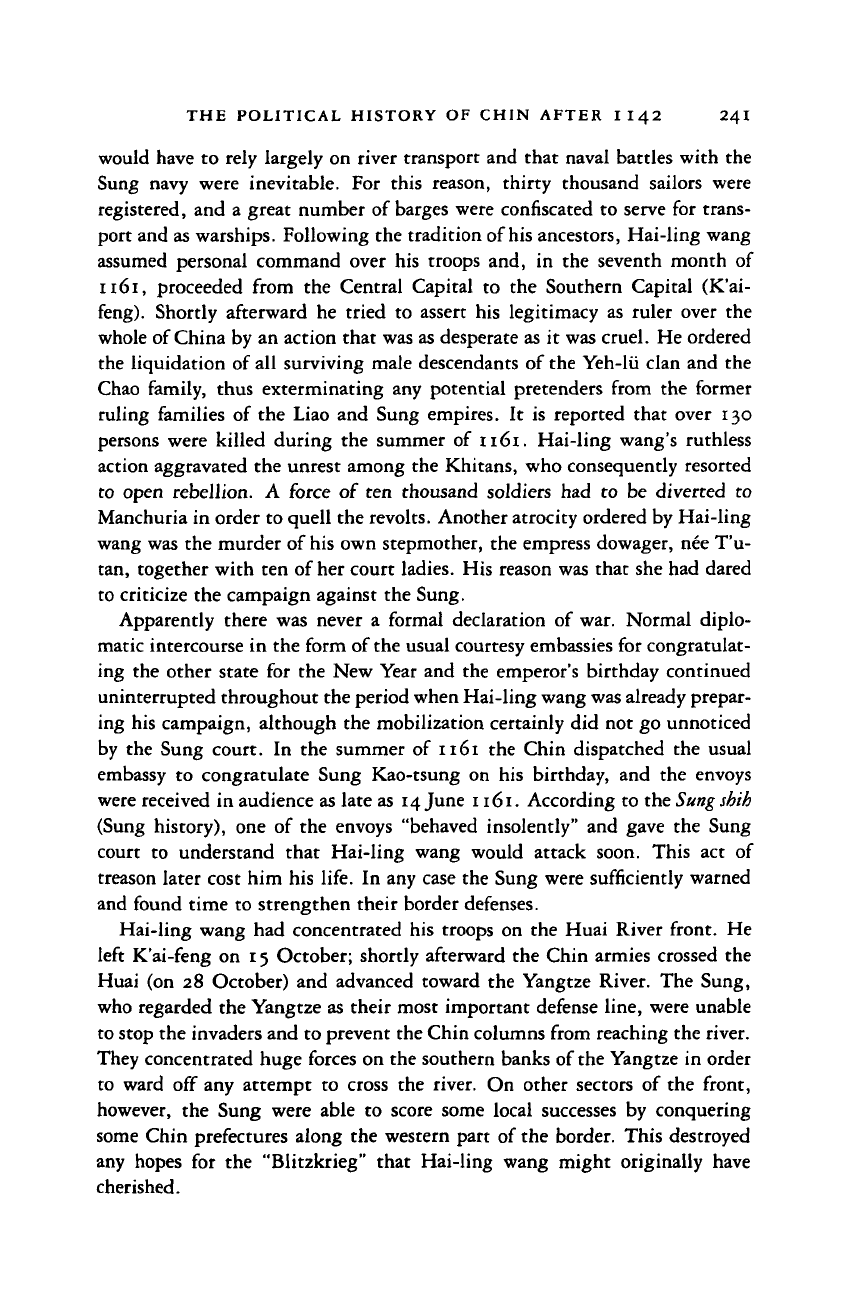
THE
POLITICAL HISTORY
OF
CHIN AFTER II42
241
would have to rely largely on river transport and that naval battles with the
Sung navy were inevitable. For this reason, thirty thousand sailors were
registered, and a great number of barges were confiscated to serve for trans-
port and as warships. Following the tradition of his ancestors, Hai-ling wang
assumed personal command over his troops and, in the seventh month of
1161,
proceeded from the Central Capital to the Southern Capital (K'ai-
feng).
Shortly afterward he tried to assert his legitimacy as ruler over the
whole of China by an action that was as desperate as it was cruel. He ordered
the liquidation of all surviving male descendants of the Yeh-lii clan and the
Chao family, thus exterminating any potential pretenders from the former
ruling families of the Liao and Sung empires. It is reported that over 130
persons were killed during the summer of 1161. Hai-ling wang's ruthless
action aggravated the unrest among the Khitans, who consequently resorted
to open rebellion. A force of ten thousand soldiers had to be diverted to
Manchuria in order to quell the revolts. Another atrocity ordered by Hai-ling
wang was the murder of his own stepmother, the empress dowager, nee T'u-
tan, together with ten of her court ladies. His reason was that she had dared
to criticize the campaign against the Sung.
Apparently there was never a formal declaration of war. Normal diplo-
matic intercourse in the form of
the
usual courtesy embassies for congratulat-
ing the other state for the New Year and the emperor's birthday continued
uninterrupted throughout the period when Hai-ling wang was already prepar-
ing his campaign, although the mobilization certainly did not go unnoticed
by the Sung court. In the summer of 1161 the Chin dispatched the usual
embassy to congratulate Sung Kao-tsung on his birthday, and the envoys
were received in audience as late as
14
June 1161. According to the
Sung shih
(Sung history), one of the envoys "behaved insolently" and gave the Sung
court to understand that Hai-ling wang would attack soon. This act of
treason later cost him his life. In any case the Sung were sufficiently warned
and found time to strengthen their border defenses.
Hai-ling wang had concentrated his troops on the Huai River front. He
left K'ai-feng on 15 October; shortly afterward the Chin armies crossed the
Huai (on 28 October) and advanced toward the Yangtze River. The Sung,
who regarded the Yangtze as their most important defense line, were unable
to stop the invaders and to prevent the Chin columns from reaching the river.
They concentrated huge forces on the southern banks of
the
Yangtze in order
to ward off any attempt to cross the river. On other sectors of the front,
however, the Sung were able to score some local successes by conquering
some Chin prefectures along the western part of the border. This destroyed
any hopes for the "Blitzkrieg" that Hai-ling wang might originally have
cherished.
Cambridge Histories Online © Cambridge University Press, 2008
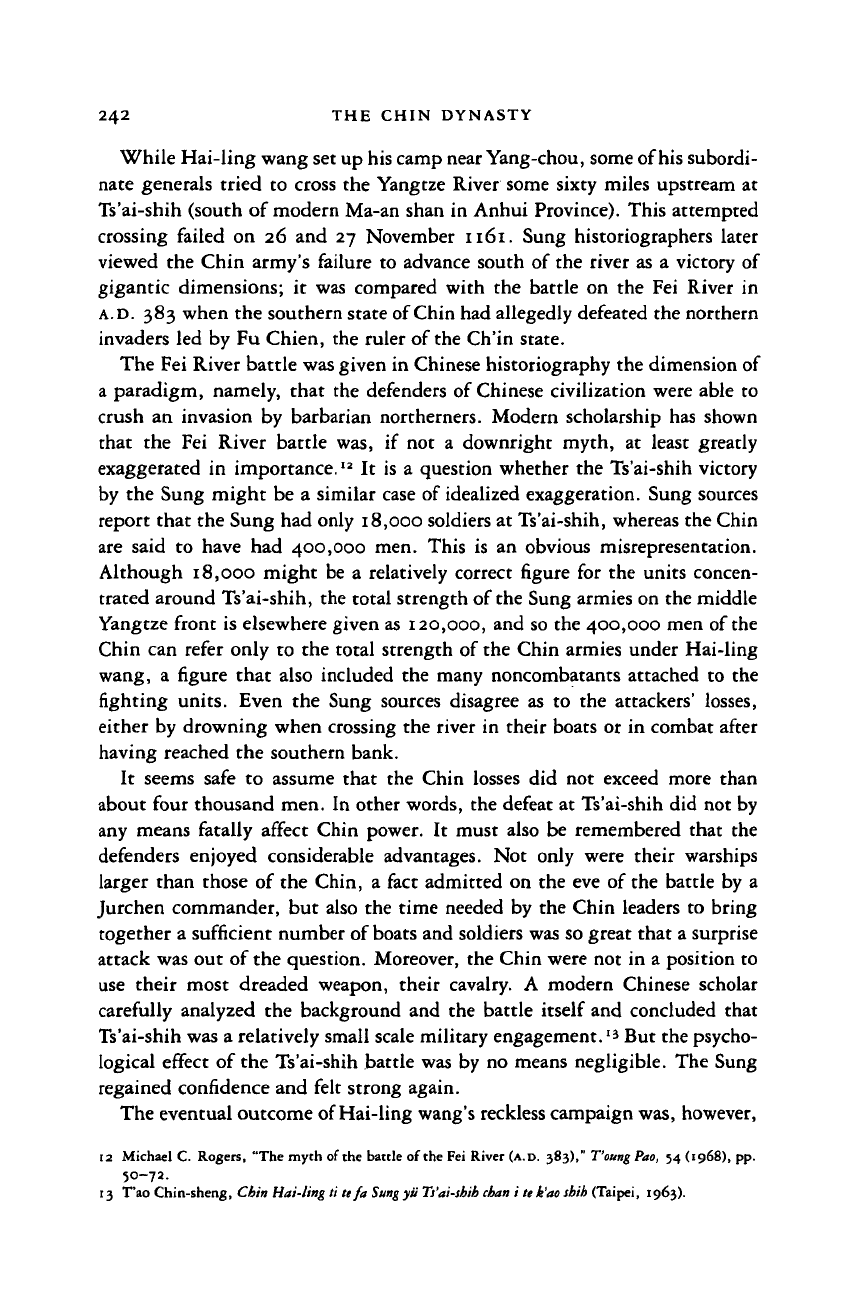
242 THE CHIN DYNASTY
While Hai-ling wang set up his camp near Yang-chou, some of his subordi-
nate generals tried to cross the Yangtze River some sixty miles upstream at
Ts'ai-shih (south of modern Ma-an shan in Anhui Province). This attempted
crossing failed
on 26
and 27 November 1161. Sung historiographers later
viewed the Chin army's failure to advance south of the river as
a
victory of
gigantic dimensions;
it
was compared with the battle on the Fei River
in
A.D.
383 when the southern state of Chin had allegedly defeated the northern
invaders led by Fu Chien, the ruler of the Ch'in state.
The Fei River battle was given in Chinese historiography the dimension of
a paradigm, namely, that the defenders of Chinese civilization were able
to
crush
an
invasion
by
barbarian northerners. Modern scholarship has shown
that
the Fei
River battle was,
if
not
a
downright myth,
at
least greatly
exaggerated
in
importance.
I2
It
is
a
question whether the Ts'ai-shih victory
by the Sung might be
a
similar case of idealized exaggeration. Sung sources
report that the Sung had only 18,000 soldiers at Ts'ai-shih, whereas the Chin
are said
to
have had 400,000 men. This
is an
obvious misrepresentation.
Although 18,000 might be
a
relatively correct figure for the units concen-
trated around Ts'ai-shih, the total strength of the Sung armies on the middle
Yangtze front is elsewhere given as 120,000, and so the 400,000 men of the
Chin can refer only to the total strength of the Chin armies under Hai-ling
wang,
a
figure that also included the many noncombatants attached
to
the
fighting
units.
Even the Sung sources disagree as
to
the attackers' losses,
either by drowning when crossing the river in their boats or in combat after
having reached the southern bank.
It seems safe
to
assume that the Chin losses
did
not exceed more than
about four thousand men. In other words, the defeat at Ts'ai-shih did not by
any means fatally affect Chin power.
It
must also be remembered that the
defenders enjoyed considerable advantages.
Not
only were their warships
larger than those of the Chin,
a
fact admitted on the eve of the battle by
a
Jurchen commander, but also the time needed by the Chin leaders to bring
together a sufficient number of boats and soldiers was so great that a surprise
attack was out of the question. Moreover, the Chin were not in a position to
use their most dreaded weapon, their cavalry.
A
modern Chinese scholar
carefully analyzed the background and the battle itself and concluded that
Ts'ai-shih was a relatively small scale military engagement.
'*
But the psycho-
logical effect of the Ts'ai-shih battle was by no means negligible. The Sung
regained confidence and felt strong again.
The eventual outcome of Hai-ling wang's reckless campaign was, however,
12 Michael C. Rogers, "The myth of the battle of the Fei River
(A.D.
383),"
T'oung
Poo,
54 (1968), pp.
50-72.
13 T'ao Chin-sheng, Chin Hai-ling ti u fa Sungyii
Ts'ai-shih chan
i
te
k'ao
shih
(Taipei, 1963).
Cambridge Histories Online © Cambridge University Press, 2008
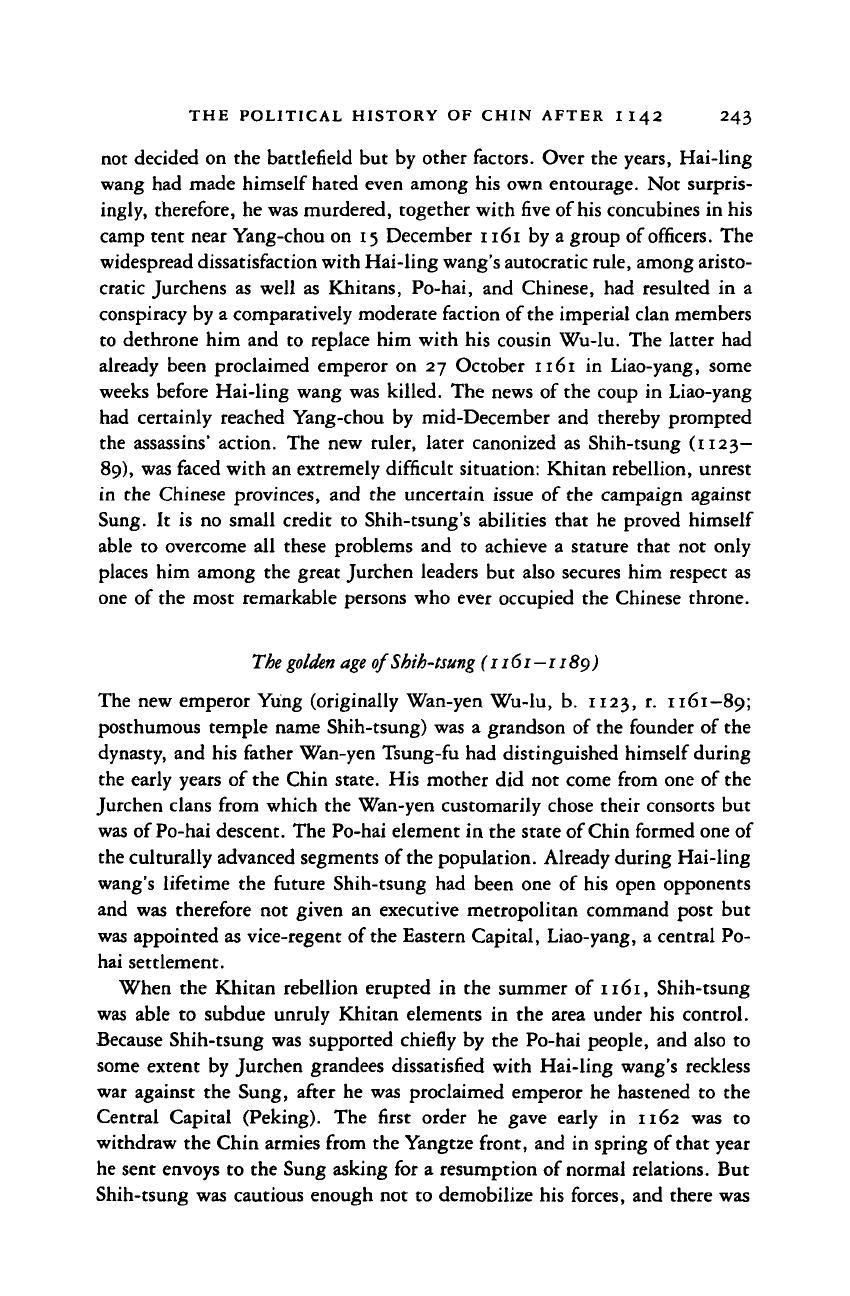
THE POLITICAL HISTORY
OF
CHIN AFTER II42
243
not decided on the battlefield but by other factors. Over the years, Hai-ling
wang had made himself hated even among his own entourage. Not surpris-
ingly, therefore, he was murdered, together with five of
his
concubines in his
camp tent near Yang-chou on 15 December 1161 by a group of officers. The
widespread dissatisfaction with Hai-ling wang's autocratic rule, among aristo-
cratic Jurchens as well as Khitans, Po-hai, and Chinese, had resulted in a
conspiracy by a comparatively moderate faction of
the
imperial clan members
to dethrone him and to replace him with his cousin Wu-lu. The latter had
already been proclaimed emperor on 27 October 1161 in Liao-yang, some
weeks before Hai-ling wang was killed. The news of the coup in Liao-yang
had certainly reached Yang-chou by mid-December and thereby prompted
the assassins' action. The new ruler, later canonized as Shih-tsung
(1123—
89),
was faced with an extremely difficult situation: Khitan rebellion, unrest
in the Chinese provinces, and the uncertain issue of the campaign against
Sung. It is no small credit to Shih-tsung's abilities that he proved himself
able to overcome all these problems and to achieve a stature that not only
places him among the great Jurchen leaders but also secures him respect as
one of the most remarkable persons who ever occupied the Chinese throne.
The
golden
age
of Shih-tsung (1161—1189)
The new emperor Yung (originally Wan-yen Wu-lu, b. 1123, r. 1161-89;
posthumous temple name Shih-tsung) was a grandson of the founder of the
dynasty, and his father Wan-yen Tsung-fu had distinguished himself during
the early years of the Chin state. His mother did not come from one of the
Jurchen clans from which the Wan-yen customarily chose their consorts but
was of
Po-hai
descent. The Po-hai element in the state of Chin formed one of
the culturally advanced segments of the population. Already during Hai-ling
wang's lifetime the future Shih-tsung had been one of his open opponents
and was therefore not given an executive metropolitan command post but
was appointed as vice-regent of the Eastern Capital, Liao-yang, a central Po-
hai settlement.
When the Khitan rebellion erupted in the summer of 1161, Shih-tsung
was able to subdue unruly Khitan elements in the area under his control.
Because Shih-tsung was supported chiefly by the Po-hai people, and also to
some extent by Jurchen grandees dissatisfied with Hai-ling wang's reckless
war against the Sung, after he was proclaimed emperor he hastened to the
Central Capital (Peking). The first order he gave early in n62 was to
withdraw the Chin armies from the Yangtze front, and in spring of that year
he sent envoys to the Sung asking for a resumption of normal relations. But
Shih-tsung was cautious enough not to demobilize his forces, and there was
Cambridge Histories Online © Cambridge University Press, 2008
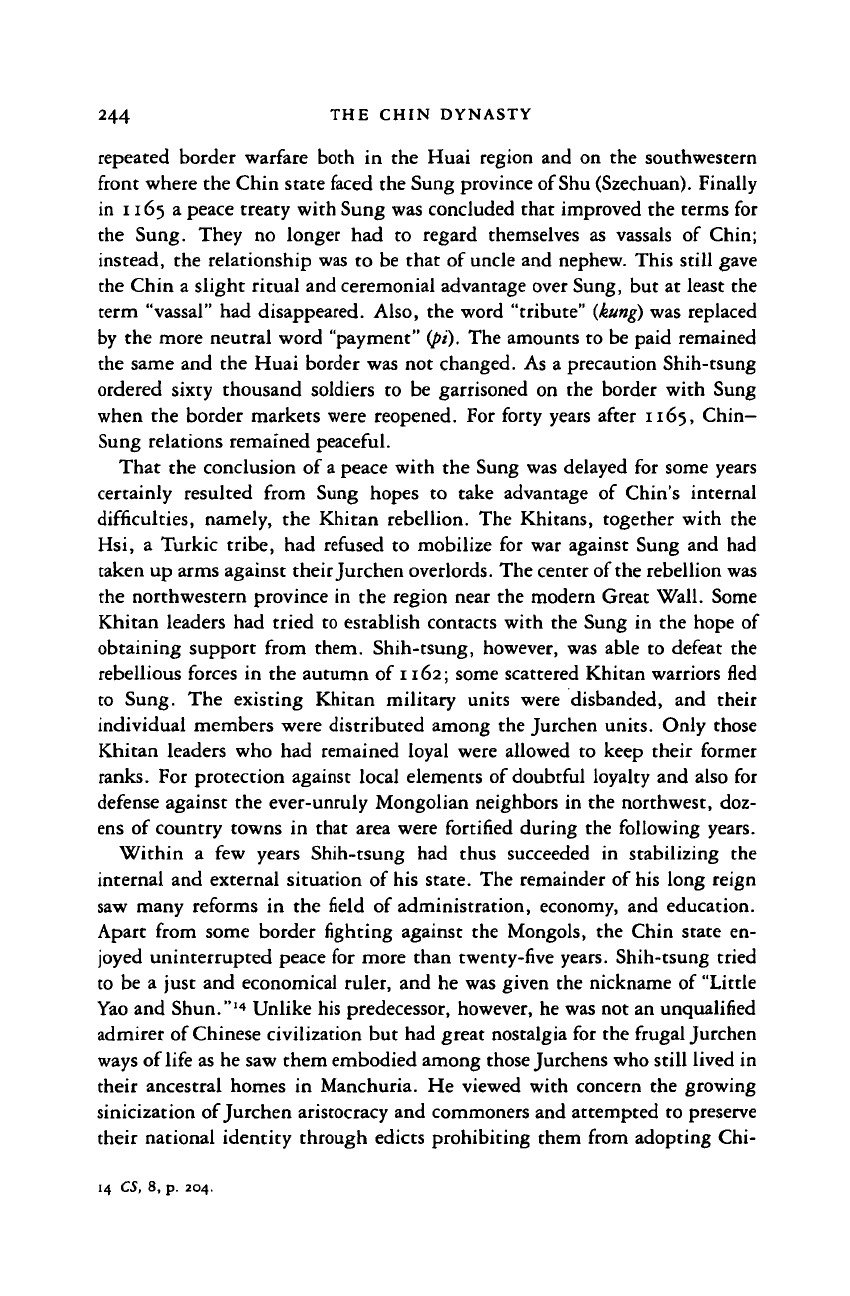
244
THE
CHIN DYNASTY
repeated border warfare both in the Huai region and on the southwestern
front where the Chin state faced the Sung province of Shu (Szechuan). Finally
in 1165 a peace treaty with Sung was concluded that improved the terms for
the Sung. They no longer had to regard themselves as vassals of Chin;
instead, the relationship was to be that of uncle and nephew. This still gave
the Chin a slight ritual and ceremonial advantage over Sung, but at least the
term "vassal" had disappeared. Also, the word "tribute"
(kung)
was replaced
by the more neutral word "payment"
(pi).
The amounts to be paid remained
the same and the Huai border was not changed. As a precaution Shih-tsung
ordered sixty thousand soldiers to be garrisoned on the border with Sung
when the border markets were reopened. For forty years after 1165, Chin-
Sung relations remained peaceful.
That the conclusion of
a
peace with the Sung was delayed for some years
certainly resulted from Sung hopes to take advantage of Chin's internal
difficulties, namely, the Khitan rebellion. The Khitans, together with the
Hsi,
a Turkic tribe, had refused to mobilize for war against Sung and had
taken up arms against their Jurchen overlords. The center of the rebellion was
the northwestern province in the region near the modern Great Wall. Some
Khitan leaders had tried to establish contacts with the Sung in the hope of
obtaining support from them. Shih-tsung, however, was able to defeat the
rebellious forces in the autumn of 1162; some scattered Khitan warriors fled
to Sung. The existing Khitan military units were disbanded, and their
individual members were distributed among the Jurchen units. Only those
Khitan leaders who had remained loyal were allowed to keep their former
ranks.
For protection against local elements of doubtful loyalty and also for
defense against the ever-unruly Mongolian neighbors in the northwest, doz-
ens of country towns in that area were fortified during the following years.
Within a few years Shih-tsung had thus succeeded in stabilizing the
internal and external situation of his state. The remainder of his long reign
saw many reforms in the field of administration, economy, and education.
Apart from some border fighting against the Mongols, the Chin state en-
joyed uninterrupted peace for more than twenty-five years. Shih-tsung tried
to be a just and economical ruler, and he was given the nickname of "Little
Yao and Shun."
14
Unlike his predecessor, however, he was not an unqualified
admirer of Chinese civilization but had great nostalgia for the frugal Jurchen
ways of life as he saw them embodied among
those
Jurchens who still lived in
their ancestral homes in Manchuria. He viewed with concern the growing
sinicization of Jurchen aristocracy and commoners and attempted to preserve
their national identity through edicts prohibiting them from adopting Chi-
14 CS, 8, p. 204.
Cambridge Histories Online © Cambridge University Press, 2008
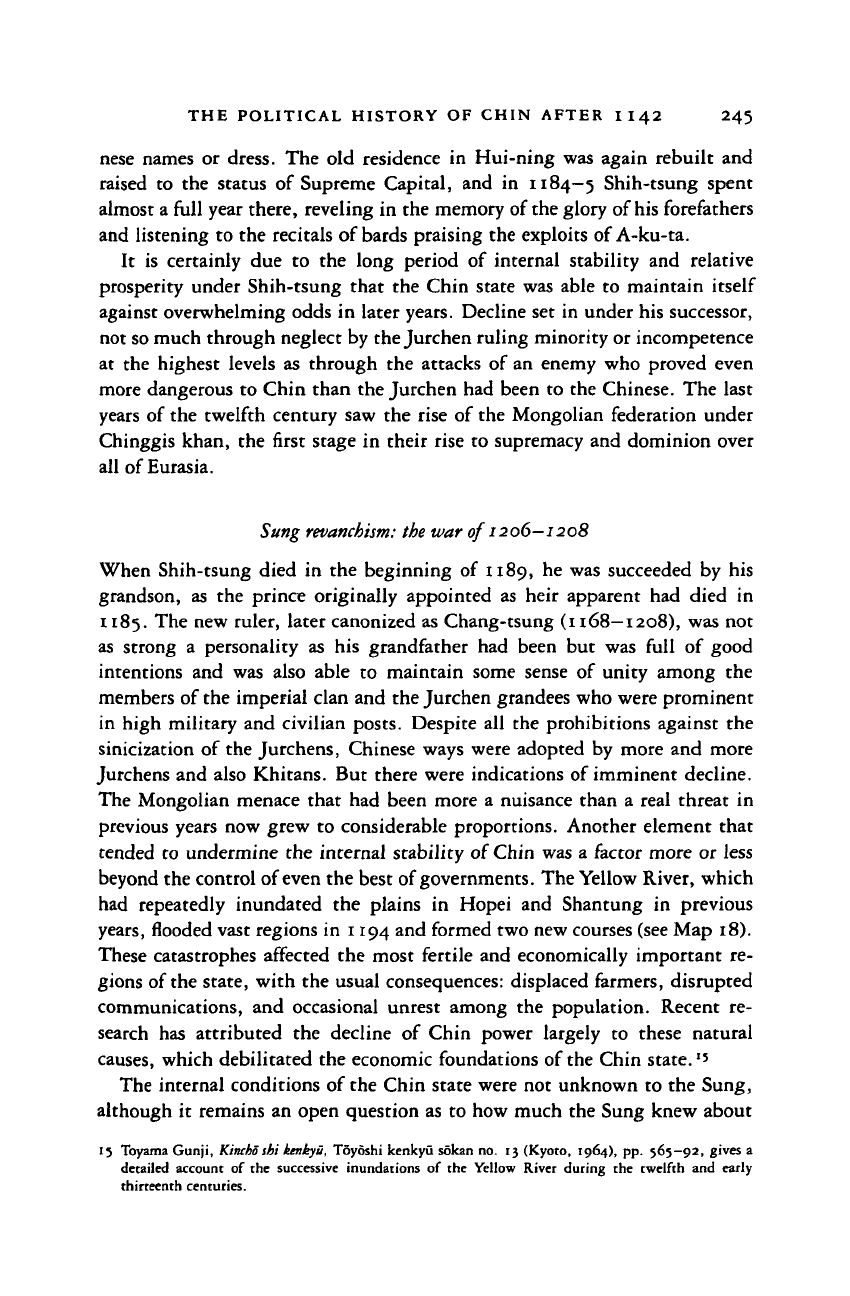
THE
POLITICAL HISTORY
OF
CHIN AFTER II42
245
nese names or dress. The old residence in Hui-ning was again rebuilt and
raised to the status of Supreme Capital, and in 1184-5 Shih-tsung spent
almost a full year there, reveling in the memory of the glory of
his
forefathers
and listening to the recitals of bards praising the exploits of A-ku-ta.
It is certainly due to the long period of internal stability and relative
prosperity under Shih-tsung that the Chin state was able to maintain itself
against overwhelming odds in later years. Decline set in under his successor,
not so much through neglect by the Jurchen ruling minority or incompetence
at the highest levels as through the attacks of an enemy who proved even
more dangerous to Chin than the Jurchen had been to the Chinese. The last
years of the twelfth century saw the rise of the Mongolian federation under
Chinggis khan, the first stage in their rise to supremacy and dominion over
all of Eurasia.
Sung
revanchism:
the war 0/1206—1208
When Shih-tsung died in the beginning of 1189, he was succeeded by his
grandson, as the prince originally appointed as heir apparent had died in
1185.
The new ruler, later canonized as Chang-tsung (1168—1208), was not
as strong a personality as his grandfather had been but was full of good
intentions and was also able to maintain some sense of unity among the
members of the imperial clan and the Jurchen grandees who were prominent
in high military and civilian posts. Despite all the prohibitions against the
sinicization of the Jurchens, Chinese ways were adopted by more and more
Jurchens and also Khitans. But there were indications of imminent decline.
The Mongolian menace that had been more a nuisance than a real threat in
previous years now grew to considerable proportions. Another element that
tended to undermine the internal stability of Chin was a factor more or less
beyond the control of even the best of governments. The Yellow River, which
had repeatedly inundated the plains in Hopei and Shantung in previous
years,
flooded
vast regions in 1194 and formed two new courses (see Map 18).
These catastrophes affected the most fertile and economically important re-
gions of the state, with the usual consequences: displaced farmers, disrupted
communications, and occasional unrest among the population. Recent re-
search has attributed the decline of Chin power largely to these natural
causes, which debilitated the economic foundations of the Chin state.
1
'
The internal conditions of the Chin state were not unknown to the Sung,
although it remains an open question as to how much the Sung knew about
15 Toyama Gunji,
Kincho
shi kenkyii, Toyoshi kenkyu sokan no. 13 (Kyoto, 1964), pp. 565-92, gives a
detailed account of the successive inundations of the Yellow Rivet duting the twelfth and early
thirteenth centuries.
Cambridge Histories Online © Cambridge University Press, 2008
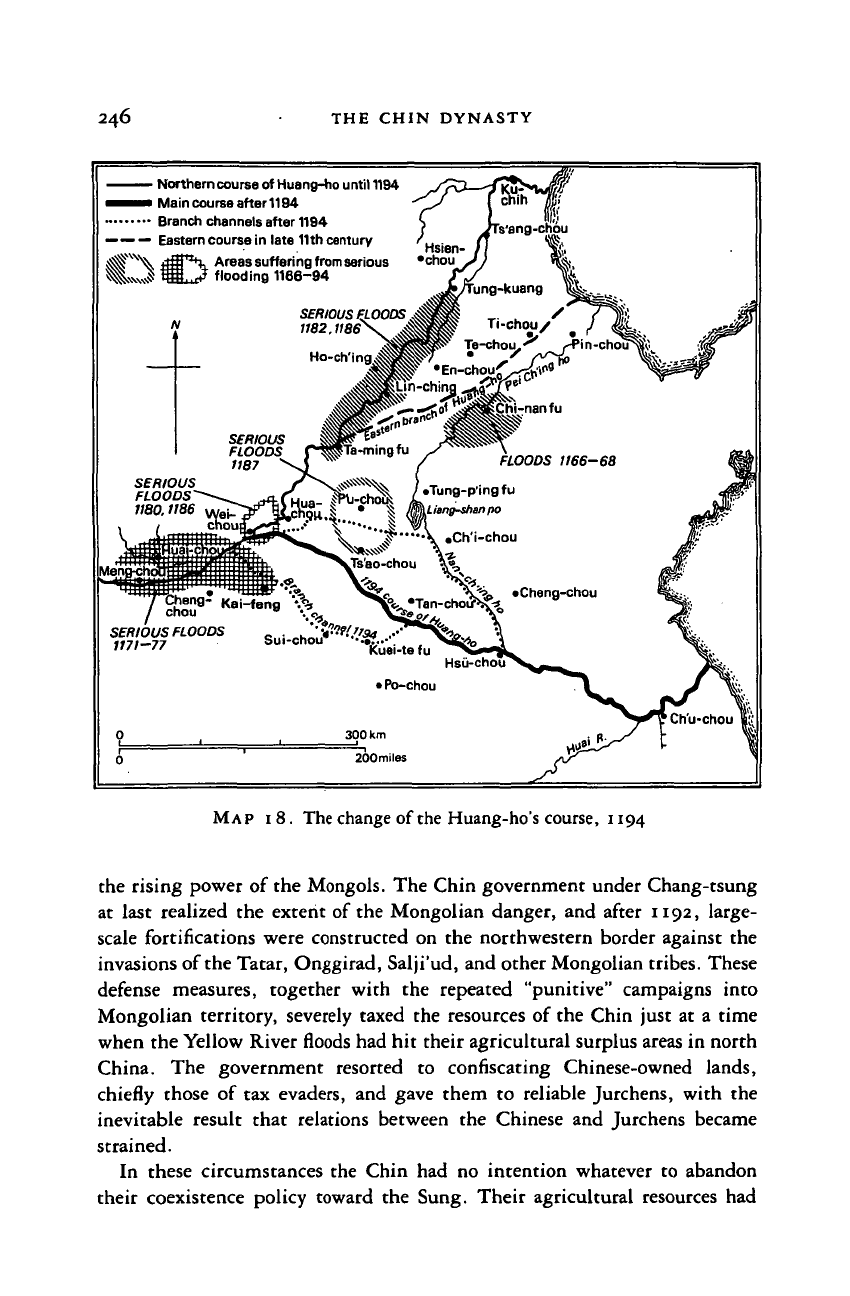
246
THE CHIN DYNASTY
Northern
course
of
Huang-ho until 1194
^HB
Main course
after
1194
Branch channels after
1194
— — — Eastern course in
late
11th
century
S^
Areas
suffering from serious
flooding 1166-94
FLOODS
1166-68
Tung-p'ing f u
Liangshan po
'i-chou
MAP
18. The change of
the
Huang-ho's course, 1194
the rising power of the Mongols. The Chin government under Chang-tsung
at last realized the extent of the Mongolian danger, and after 1192, large-
scale fortifications were constructed on the northwestern border against the
invasions of
the
Tatar, Onggirad, Salji'ud, and other Mongolian tribes. These
defense measures, together with the repeated "punitive" campaigns into
Mongolian territory, severely taxed the resources of the Chin just at a time
when the Yellow River
floods
had hit their agricultural surplus areas in north
China. The government resorted to confiscating Chinese-owned lands,
chiefly those of tax evaders, and gave them to reliable Jurchens, with the
inevitable result that relations between the Chinese and Jurchens became
strained.
In these circumstances the Chin had no intention whatever to abandon
their coexistence policy toward the Sung. Their agricultural resources had
Cambridge Histories Online © Cambridge University Press, 2008
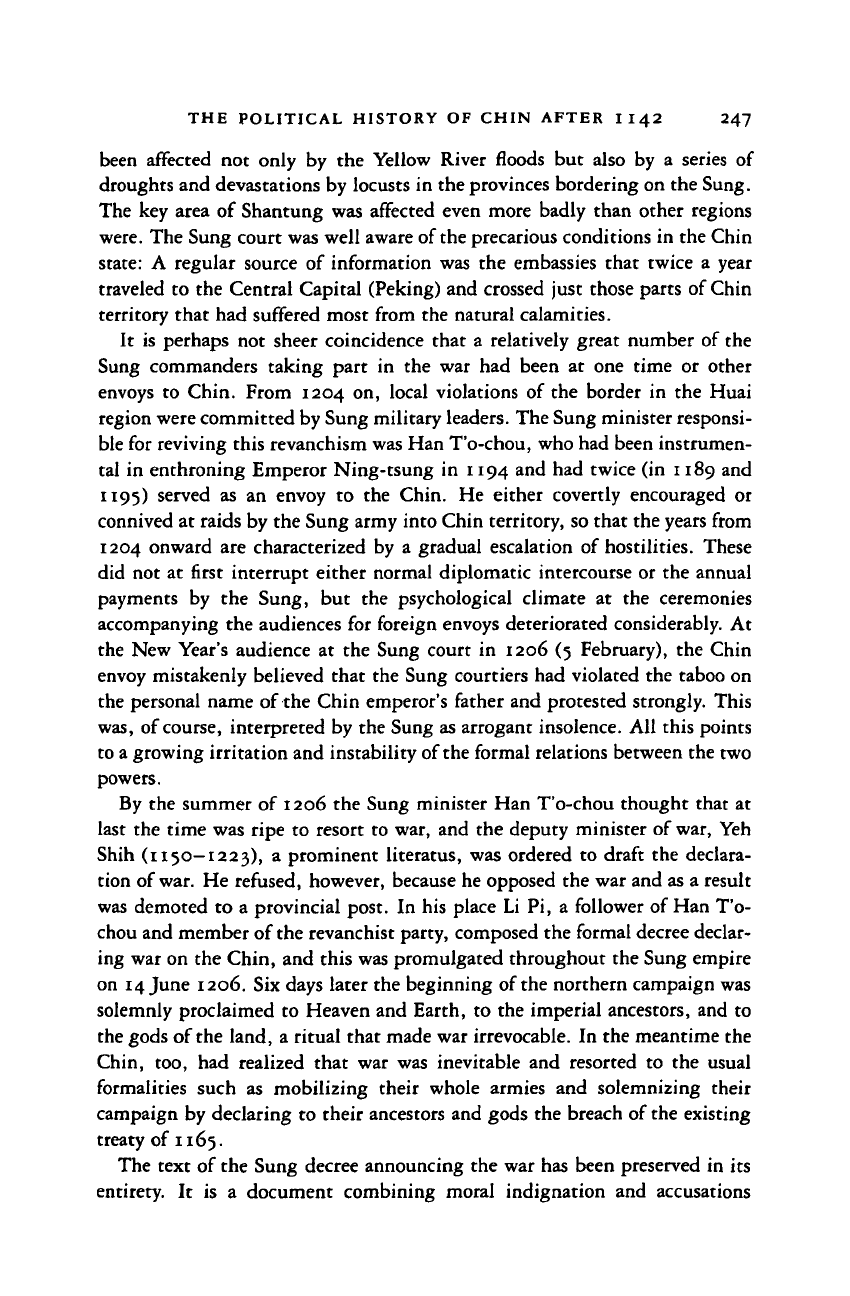
THE POLITICAL HISTORY OF CHIN AFTER 1142 247
been affected not only by the Yellow River floods but also by a series of
droughts and devastations by locusts in the provinces bordering on the Sung.
The key area of Shantung was affected even more badly than other regions
were. The Sung court was well aware of
the
precarious conditions in the Chin
state:
A regular source of information was the embassies that twice a year
traveled to the Central Capital (Peking) and crossed just those parts of Chin
territory that had suffered most from the natural calamities.
It is perhaps not sheer coincidence that a relatively great number of the
Sung commanders taking part in the war had been at one time or other
envoys to Chin. From 1204 on, local violations of the border in the Huai
region were committed by Sung military
leaders.
The Sung minister responsi-
ble for reviving this revanchism was Han T'o-chou, who had been instrumen-
tal in enthroning Emperor Ning-tsung in 1194 and had twice (in 1189 and
1195) served as an envoy to the Chin. He either covertly encouraged or
connived at raids by the Sung army into Chin territory, so that the years from
1204 onward are characterized by a gradual escalation of hostilities. These
did not at first interrupt either normal diplomatic intercourse or the annual
payments by the Sung, but the psychological climate at the ceremonies
accompanying the audiences for foreign envoys deteriorated considerably. At
the New Year's audience at the Sung court in 1206 (5 February), the Chin
envoy mistakenly believed that the Sung courtiers had violated the taboo on
the personal name of the Chin emperor's father and protested strongly. This
was,
of
course,
interpreted by the Sung as arrogant insolence. All this points
to a growing irritation and instability of the formal relations between the two
powers.
By the summer of 1206 the Sung minister Han T'o-chou thought that at
last the time was ripe to resort to war, and the deputy minister of
war,
Yeh
Shih (1150-1223), a prominent literatus, was ordered to draft the declara-
tion of
war.
He refused, however, because he opposed the war and as a result
was demoted to a provincial post. In his place Li Pi, a follower of Han T'o-
chou and member of
the
revanchist party, composed the formal decree declar-
ing war on the Chin, and this was promulgated throughout the Sung empire
on
14
June 1206. Six days later the beginning of the northern campaign was
solemnly proclaimed to Heaven and Earth, to the imperial ancestors, and to
the gods of
the
land, a ritual that made war irrevocable. In the meantime the
Chin, too, had realized that war was inevitable and resorted to the usual
formalities such as mobilizing their whole armies and solemnizing their
campaign by declaring to their ancestors and gods the breach of the existing
treaty of 1165.
The text of the Sung decree announcing the war has been preserved in its
entirety. It is a document combining moral indignation and accusations
Cambridge Histories Online © Cambridge University Press, 2008
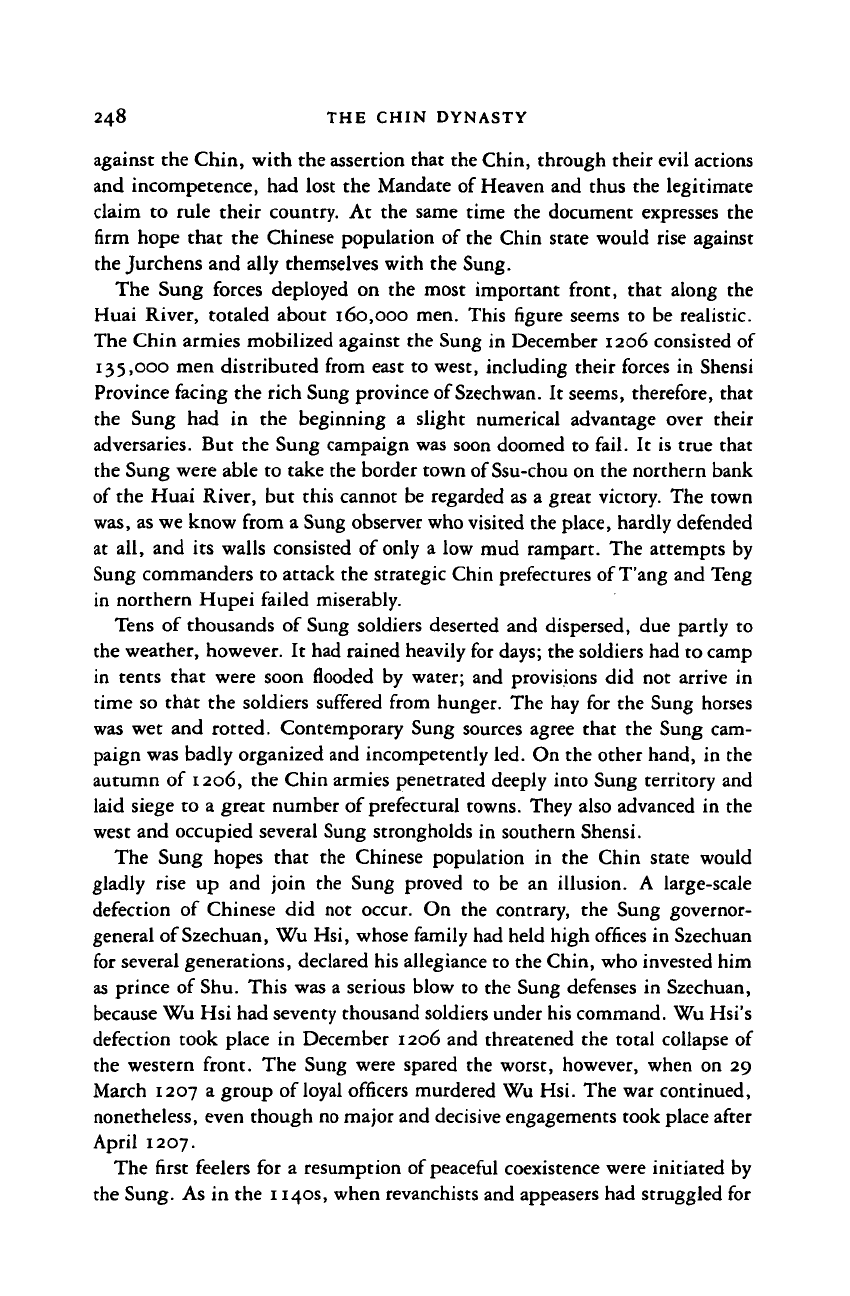
248 THE CHIN DYNASTY
against the Chin, with the assertion that the Chin, through their evil actions
and incompetence, had lost the Mandate of Heaven and thus the legitimate
claim to rule their country. At the same time the document expresses the
firm hope that the Chinese population of the Chin state would rise against
the Jurchens and ally themselves with the Sung.
The Sung forces deployed on the most important front, that along the
Huai River, totaled about 160,000 men. This figure seems to be realistic.
The Chin armies mobilized against the Sung in December 1206 consisted of
135,000 men distributed from east to west, including their forces in Shensi
Province facing the rich Sung province of Szechwan. It seems, therefore, that
the Sung had in the beginning a slight numerical advantage over their
adversaries. But the Sung campaign was soon doomed to fail. It is true that
the Sung were able to take the border town of Ssu-chou on the northern bank
of the Huai River, but this cannot be regarded as a great victory. The town
was,
as we know from a Sung observer who visited the place, hardly defended
at all, and its walls consisted of only a low mud rampart. The attempts by
Sung commanders to attack the strategic Chin prefectures of T'ang and Teng
in northern Hupei failed miserably.
Tens of thousands of Sung soldiers deserted and dispersed, due partly to
the weather, however. It had rained heavily for
days;
the soldiers had to camp
in tents that were soon flooded by water; and provisions did not arrive in
time so that the soldiers suffered from hunger. The hay for the Sung horses
was wet and rotted. Contemporary Sung sources agree that the Sung cam-
paign was badly organized and incompetently led. On the other hand, in the
autumn of 1206, the Chin armies penetrated deeply into Sung territory and
laid siege to a great number of prefectural towns. They also advanced in the
west and occupied several Sung strongholds in southern Shensi.
The Sung hopes that the Chinese population in the Chin state would
gladly rise up and join the Sung proved to be an illusion. A large-scale
defection of Chinese did not occur. On the contrary, the Sung governor-
general of Szechuan, Wu Hsi, whose family had held high offices in Szechuan
for several generations, declared his allegiance to the Chin, who invested him
as prince of Shu. This was a serious blow to the Sung defenses in Szechuan,
because Wu Hsi had seventy thousand soldiers under his command. Wu Hsi's
defection took place in December 1206 and threatened the total collapse of
the western front. The Sung were spared the worst, however, when on 29
March 1207 a group of loyal officers murdered Wu Hsi. The war continued,
nonetheless, even though no major and decisive engagements took place after
April 1207.
The first feelers for a resumption of peaceful coexistence were initiated by
the Sung. As in the 1140s, when revanchists and appeasers had struggled for
Cambridge Histories Online © Cambridge University Press, 2008
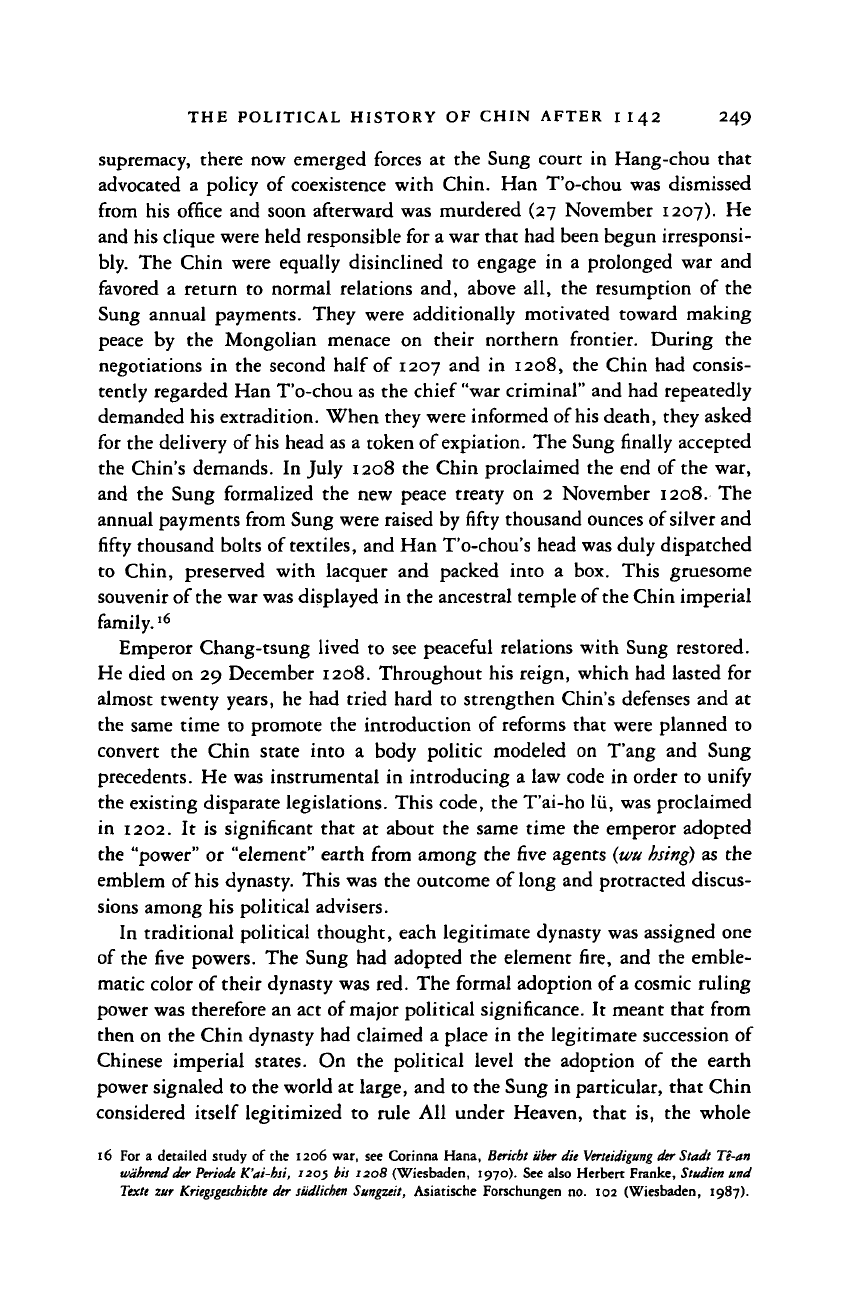
THE
POLITICAL HISTORY
OF
CHIN AFTER II42
249
supremacy, there now emerged forces at the Sung court in Hang-chou that
advocated a policy of coexistence with Chin. Han T'o-chou was dismissed
from his office and soon afterward was murdered (27 November 1207). He
and his clique were held responsible for a war that had been begun irresponsi-
bly. The Chin were equally disinclined to engage in a prolonged war and
favored a return to normal relations and, above all, the resumption of the
Sung annual payments. They were additionally motivated toward making
peace by the Mongolian menace on their northern frontier. During the
negotiations in the second half of 1207 and in 1208, the Chin had consis-
tently regarded Han T'o-chou as the chief "war criminal" and had repeatedly
demanded his extradition. When they were informed of
his
death, they asked
for the delivery of
his
head as a token of expiation. The Sung
finally
accepted
the Chin's demands. In July 1208 the Chin proclaimed the end of the war,
and the Sung formalized the new peace treaty on 2 November 1208. The
annual payments from Sung were raised by fifty thousand ounces of silver and
fifty thousand bolts of
textiles,
and Han T'o-chou's head was duly dispatched
to Chin, preserved with lacquer and packed into a box. This gruesome
souvenir of
the
war was displayed in the ancestral temple of the Chin imperial
family.
l6
Emperor Chang-tsung lived to see peaceful relations with Sung restored.
He died on 29 December 1208. Throughout his reign, which had lasted for
almost twenty years, he had tried hard to strengthen Chin's defenses and at
the same time to promote the introduction of reforms that were planned to
convert the Chin state into a body politic modeled on T'ang and Sung
precedents. He was instrumental in introducing a law code in order to unify
the existing disparate legislations. This code, the T'ai-ho lii, was proclaimed
in 1202. It is significant that at about the same time the emperor adopted
the "power" or "element" earth from among the five agents
{wu hsing)
as the
emblem of
his
dynasty. This was the outcome of long and protracted discus-
sions among his political advisers.
In traditional political thought, each legitimate dynasty was assigned one
of the five powers. The Sung had adopted the element fire, and the emble-
matic color of their dynasty was red. The formal adoption of
a
cosmic ruling
power was therefore an act of major political significance. It meant that from
then on the Chin dynasty had claimed a place in the legitimate succession of
Chinese imperial states. On the political level the adoption of the earth
power signaled to the world at large, and to the Sung in particular, that Chin
considered itself legitimized to rule All under Heaven, that is, the whole
16 For a detailed study of the 1206 war, see Corinna Hana, Bericht iibtr die
Verteidigung
der Stadt Te-an
wdhrend der
Periode
K'ai-hsi, 1205 bis 1208 (Wiesbaden, 1970). See also Herbert Franke, Studien und
Texte zur
Kriegsgachicbte
der
siidlichen
Sungzcit, Asiatische Forschungen no. 102 (Wiesbaden, 1987).
Cambridge Histories Online © Cambridge University Press, 2008
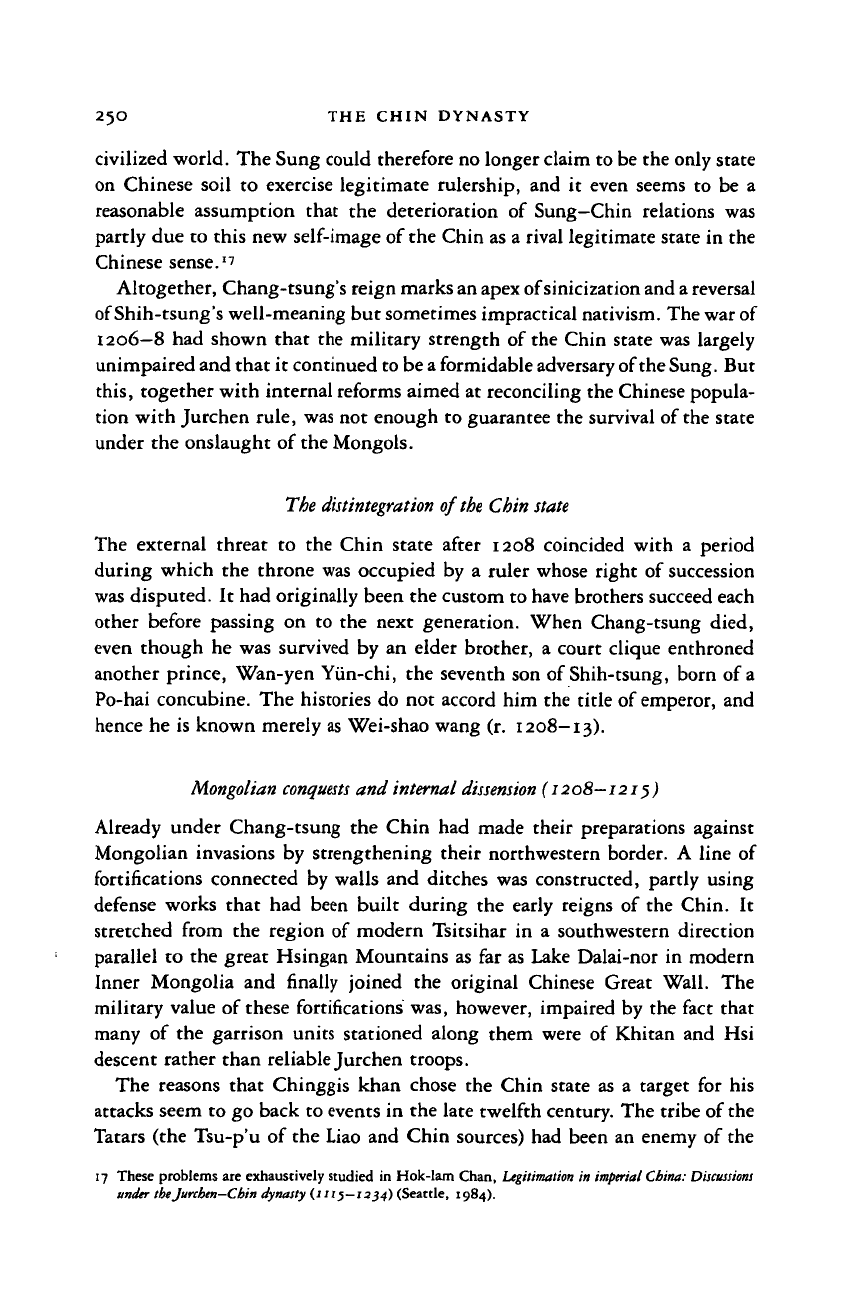
250 THE CHIN DYNASTY
civilized world. The Sung could therefore no longer claim to be the only state
on Chinese soil
to
exercise legitimate rulership, and
it
even seems
to
be
a
reasonable assumption that
the
deterioration
of
Sung-Chin relations was
partly due to this new self-image of the Chin as a rival legitimate state in the
Chinese sense.
17
Altogether, Chang-tsung's reign marks an apex of sinicization and
a
reversal
of Shih-tsung's well-meaning but sometimes impractical nativism. The war of
1206—8 had shown that the military strength of the Chin state was largely
unimpaired and that it continued to be
a
formidable adversary of the
Sung.
But
this,
together with internal reforms aimed at reconciling the Chinese popula-
tion with Jurchen rule, was not enough to guarantee the survival of the state
under the onslaught of the Mongols.
The
distintegration
of
the
Chin state
The external threat
to
the Chin state after 1208 coincided with
a
period
during which the throne was occupied by
a
ruler whose right of succession
was disputed. It had originally been the custom to have brothers succeed each
other before passing
on
to the next generation. When Chang-tsung died,
even though he was survived by an elder brother,
a
court clique enthroned
another prince, Wan-yen Yun-chi, the seventh son of Shih-tsung, born of a
Po-hai concubine. The histories do not accord him the title of emperor, and
hence he is known merely as Wei-shao wang (r. 1208—13).
Mongolian
conquests
and internal
dissension
(1208—1215)
Already under Chang-tsung the Chin had made their preparations against
Mongolian invasions by strengthening their northwestern border. A line of
fortifications connected by walls and ditches was constructed, partly using
defense works that had been built during the early reigns
of
the Chin.
It
stretched from the region
of
modern Tsitsihar
in a
southwestern direction
parallel to the great Hsingan Mountains as far as Lake Dalai-nor in modern
Inner Mongolia and finally joined
the
original Chinese Great Wall.
The
military value of these fortifications was, however, impaired by the fact that
many
of
the garrison units stationed along them were
of
Khitan and Hsi
descent rather than reliable Jurchen troops.
The reasons that Chinggis khan chose the Chin state as
a
target for his
attacks seem to go back to events in the late twelfth century. The tribe of the
Tatars (the Tsu-p'u of the Liao and Chin sources) had been an enemy of the
17 These problems are exhaustively studied
in
Hok-lam Chan, Legitimation
in
imperial China:
Discussions
under the Jurchen—Chin dynasty (1115—1234) (Seattle, 1984).
Cambridge Histories Online © Cambridge University Press, 2008
